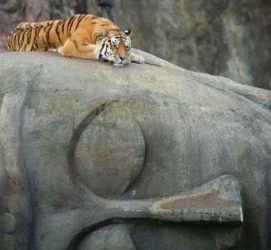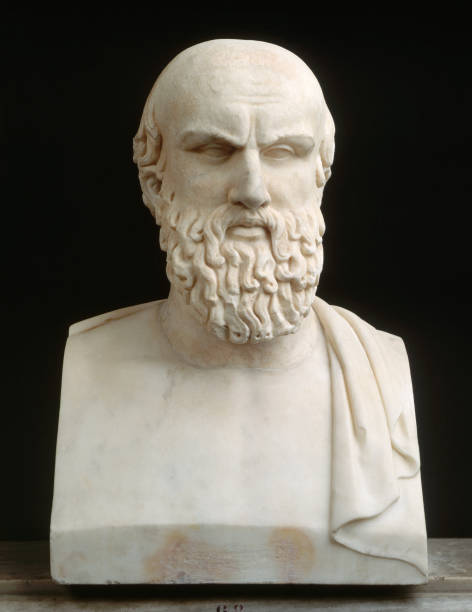
By Robinson Jeffers
The sky was cold December blue with great tumbling clouds,
and the little river
Ran full but clear. A bare-legged girl
in a red jersey was wading
in it, holding a five-tined
Hay-fork at her head’s height; suddenly she darted it down like
a heron’s beak and panting hard
Leaned on the shaft, looking down passionately, her gipsy-lean
face, then stooped and dipping
One arm to the little breasts she drew up her catch, great hammered-
silver steelhead with the tines through it
And the fingers of her left hand hooked in its
gills, her slender body
Rocked with its writhing. She took it to the near bank
And was dropping it behind a log when someone said
Quietly ‘I guess I’ve got you, Vina.’ Who gasped and looked up
At a young horseman half hidden in the willow bushes,
She’d been too intent to notice him, and said ‘My God,
I thought it was the game-warden.’ ‘Worse,’ he said smiling.
‘This river’s ours.
You can’t get near it without crossing our fences.
Besides that you mustn’t spear ’em, and . . . three, four, you
little bitch,
That’s the fifth fish.’ She answered with her gipsy face, ‘Take
half o’ them, honey. I loved the fun.’
He looked up and down her taper legs, red with cold, and said
fiercely, ‘Your fun.
To kill them and leave them rotting.’ ‘Honey, let me have one
o’ them,’ she answered,
‘You take the rest.’ He shook his blond head. ‘You’ll have to pay
a terrible fine.’ She answered laughing,
‘Don’t worry: you wouldn’t tell on me.’ He dismounted and
tied the bridle to a bough, saying ‘Nobody would.
I know a lovely place deep in the willows, full of warm grass,
safe as a house,
Where you can pay it.’ Her body seemed to grow narrower
suddenly, both hands at her throat, and the cold thighs
Pressed close together while she stared at his face, it was beautiful,
long heavy-lidded eyes like a girl’s,
‘I can’t do that, honey . . . I,’ she said shivering, ‘your wife
would kill me.’ He hardened his eyes and said
‘Let that alone.’ ‘Oh,’ she answered; the little red hands came
down from her breast and faintly
Reached toward him, her head lifting, he saw the artery on the
lit side of her throat flutter like a bird
And said ‘You’ll be sick with cold, Vina,’ flung off his coat
And folded her in it with his warmth in it and carried her
To that island in the willows.
He warmed her bruised feet in
his hands;
She paid her fine for spearing fish, and another
For taking more than the legal limit, and would willingly
Have paid a third for trespassing; he sighed and said,
‘You’ll owe me that. I’m afraid somebody might come looking
for me,
Or my colt break his bridle.’ She moaned like a dove, ‘Oh Oh
Oh Oh,
You are beautiful, Hugh.’ They returned to the stream-bank.
There,
While Vina put on her shoes-they were like a small boy’s, all
stubbed and shapeless young Flodden strung the five fish
On a willow rod through the red gills and slung them
To his saddle-horn. He led the horse and walked with Vina,
going part way home with her.
Toward the canyon sea-mouth
The water spread wide and shoal, fingering through many channels
down a broad flood-bed, and a mob of sea-gulls
Screamed at each other. Vina said, ‘That’s a horrible thing.’
‘What?’ ‘What the birds do. They’re worse than I am.’
When Flodden returned alone he rode down and watched them.
He saw that one of the thousand steelhead
Which irresistible nature herded up stream to the spawning-gravel
in the mountain, the river headwaters,
Had wandered into a shallow finger of the current, and was
forced over on his flank, sculling uneasily
In three inches of water: instantly a gaunt herring-gull hovered
and dropped, to gouge the exposed
Eye with her beak; the great fish writhing, flopping over in his
anguish, another gull’s beak
Took the other eye. Their prey was then at their mercy, writhing
blind, soon stranded, and the screaming mob
Covered him.
Young Flodden rode into them and drove them
up; he found the torn steelhead
Still slowly and ceremoniously striking the sand with his tail and
a bloody eye-socket, under the
Pavilion of wings. They cast a cold shadow on the air, a fleeting
sense of fortune’s iniquities: why should
Hugh Flodden be young and happy, mounted on a good horse,
And have had another girl besides his dear wife, while others
have to endure blindness and death,
Pain and disease, misery, old age, God knows what worse?










































 Advice for blocked writers and aspiring poets from a Nobel Prize winner’s newspaper column.
Advice for blocked writers and aspiring poets from a Nobel Prize winner’s newspaper column. 









 By Elizabeth Hardwick
By Elizabeth Hardwick










You must be logged in to post a comment.